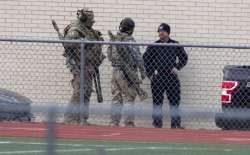Hostage situation at Texas synagogue ends; captor demanding release of Pak neuroscientist dead
Siddiqui, a Pakistani neuroscientist with advanced degrees from Brandeis University and the Massachusetts Institute of Technology, was sentenced in 2010 to 86 years in prison on charges that she assaulted and shot at US Army officers after being detained in Afghanistan two years earlier.

Hostages who had been held for hours inside a Texas synagogue were rescued Saturday night (local time), according to Gov. Greg Abbott, bringing an end to a standoff that had lasted nearly 12 hours.
“Prayers answered. All hostages are out alive and safe,” Abbott tweeted.
Abbott’s tweet came not long after a loud bang and what sounded like gunfire was heard coming from the synagogue, where authorities said a man had held people captive as he demanded the release of a Pakistani neuroscientist who was convicted of trying to kill US Army officers in Afghanistan.
The hostage-taker was later declared dead, according to a law enforcement official.
Details of the rescue or the man’s death were not immediately released.
The background
A man, demanding the release of a Pakistani neuroscientist who was convicted of trying to kill US Army officers in Afghanistan, took hostages during services at a Texas synagogue, authorities said on Saturday (local time). According to the details, the suspect could be heard ranting in a livestream. In a tweet, the Colleyville Police Department confirmed it was conducting SWAT operations at the address of Congregation Beth Israel, northeast of Fort Worth.
At least four hostages were believed to be inside the synagogue, according to two law enforcement officials who were not authorized to discuss the ongoing investigation. The synagogue’s rabbi was believed to be among the hostages, one of the officials said.
The hostage-taker was heard demanding the release of Aafia Siddiqui, a Pakistani neuroscientist suspected of having ties to al-Qaeda, who was convicted of trying to kill US military officers while in custody in Afghanistan, the officials said. He also said he wanted to be able to speak with her, according to the officials. Siddiqui is in federal prison in Texas.
A rabbi in New York City received a call from the rabbi believed to be held hostage in the synagogue to demand Siddiqui’s release, a law enforcement official said. The rabbi in New York City called 911 to report the call.
Police were first called to the synagogue around 11 am and people were evacuated from the surrounding neighborhood soon after that. There have been no reported injuries, FBI Dallas spokesperson Katie Chaumont said. She did not say whether the hostage-taker was armed.
The services were being livestreamed on the synagogue’s Facebook page for a time. The Fort Worth Star-Telegram reported that an angry man could be heard ranting and talking about religion at times during the livestream, which didn’t show what was happening inside the synagogue.
Shortly before 2 pm, the man said, “You got to do something. I don’t want to see this guy dead.” Moments later, the feed cut out. A Meta company spokesperson later confirmed that Facebook removed the video.
Multiple people heard the hostage-taker refer to Siddiqui as his “sister” on the livestream, but Faizan Syed, the executive director of Council on American-Islamic Relations in Dallas Fort-Worth Texas, told The Associated Press that Siddiqui’s brother, Mohammad Siddiqui, was not involved. Syed said CAIR’s support and prayers were with the people being held in the synagogue.
Colleyville, a community of about 26,000 people, is about 15 miles (23 kilometers) northeast of Fort Worth.
US President Joe Biden briefed about hostage situation
Meanwhile, White House press secretary Jen Psaki tweeted that President Joe Biden had been briefed and was receiving updates from senior officials.
Israeli Prime Minister Naftali Bennett said he was monitoring the situation closely. “We pray for the safety of the hostages and rescuers,” he wrote on Twitter.
Who is Aafia Siddiqui?
Siddiqui, a Pakistani neuroscientist with advanced degrees from Brandeis University and the Massachusetts Institute of Technology, was sentenced in 2010 to 86 years in prison on charges that she assaulted and shot at US Army officers after being detained in Afghanistan two years earlier. The punishment sparked outrage in Pakistan among political leaders and her supporters, who viewed her as victimized by the American criminal justice system.
In the years since, Pakistan officials have expressed interest publicly in any sort of deal or swap that could result in her release from US custody, and her case has continued to draw attention from supporters.
In 2018, for instance, an Ohio man who prosecutors say planned to fly to Texas and attack the prison where Siddiqui is being held in an attempt to free her was sentenced to 22 years in prison.
(With inputs from AP)
Also Read | 2 dead in hostage-taking incident near Paris

